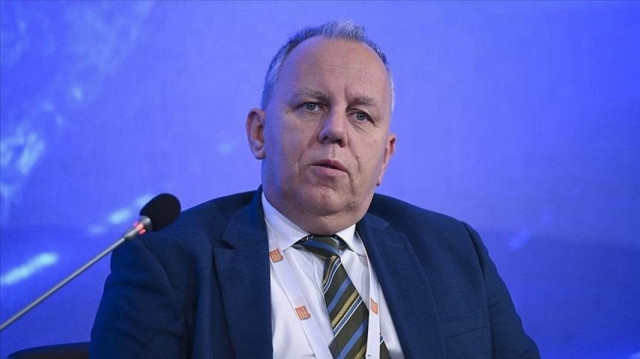

File photo
'We would like to further cooperate with Turkish firm BOTAS and increase volumes for the future,' says CEO of Hungary's state-owned energy company MVM CEEnergy
Ankara and Budapest will renew a natural gas export deal between the two countries, a senior Hungarian energy official told Anadolu.
“The further cooperation with (Turkish energy company) BOTAS is very important. We are working currently to renew last year's agreement,” said Laszlo Fritsch, the CEO of Hungary's state-owned energy company MVM CEEnergy, on the sidelines of the Istanbul Energy Forum, organized by Anadolu under the auspices of the Energy and Natural Resources Ministry.
Fritsch was referring to a 2023 deal between the Turkish Petroleum Pipeline Corporation (BOTAS) and Hungary's MVM in which Türkiye began natural gas shipments via pipeline to Hungary, its first European country destination that is not one of Türkiye's neighbors.
“We would like to further cooperate with BOTAS and to increase the volumes for the future,” he added.
Fritsch said that Hungary aims “to reach a deal by the end of this year” stretching into the years to come.
Praising the earlier deal, Fritsch said: “It was quite a pleasure to be one of the parties who signed the agreement last year in terms of gas cooperation between MVM Group of Hungary and BOTAS Group from Türkiye.”
“I think it was a milestone because as far as I know, we were the first one who actually signed an agreement with BOTAS regarding gas deliveries outside Türkiye,” he added.
“It was quite important for us,” he explained. “Because basically, it opens the gate to a new cooperation.”
“For us, the Central Eastern European region is quite important,” he said. “We have great plans. And obviously, Türkiye and BOTAS became a huge player in the market.”
“BOTAS can be the gatekeeper and can be not only a virtual but a physical hub for the whole region,” he explained.
- Green energy, Ukraine war
Saying that MVM is also working with green energy, Fritsch said: “We are dealing with nuclear. We are dealing with solar.”
“So I think the door is open for further cooperation between the two countries,” he explained.
On how European energy security supply has been affected by the ongoing Russia-Ukraine war, Fritsch said that the future of the Ukrainian transit, which is basically still a question for the months to come, is very important.
“So it is still unclear whether the transit will cease or will still flow,” he said.
“This will have quite an impact for Central European countries,” he said. “I'm talking about the Czech Republic, Austria, Slovakia, Hungary, but even Romania as well.”
“So we don't know yet what is going to happen,” he explained. “So it gives some uncertainties. But the fact that Hungary is supplied mainly by the TurkStream pipeline for us is a relief. So basically for Hungary, even if the Ukrainian transit ceases to exist, is not going to face security of supply problems."
#BOTAS
#Laszlo Fritsch
#MVM CEEnergy
